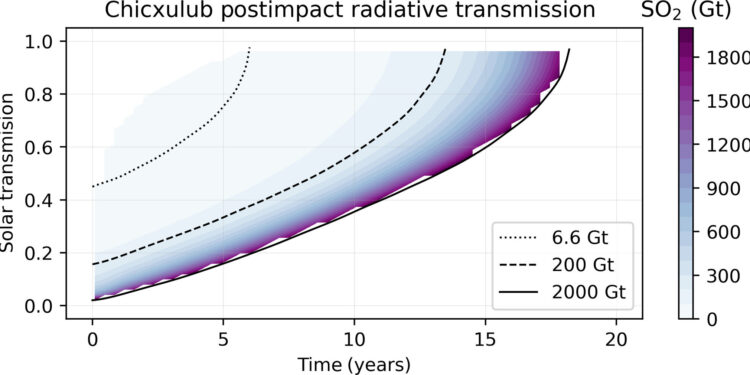Atmospheric transmission at a wavelength of 500 nm as a function of time after impact. Credit: Scientists progress (2024). DOI: 10.1126/sciadv.adk5489
A research team has chosen a side in the “Snowball Earth” debate over the possible cause of planet-wide deep freeze episodes that occurred in the distant past. According to their new study, these so-called “snowball” Earth periods, during which the planet’s surface was covered in ice for thousands or even millions of years, could have been triggered abruptly by large asteroids that struck Earth.
The results, detailed in the review Scientists progress, could answer a question that has troubled scientists for decades about some of the most dramatic climate changes known in Earth’s history. In addition to Yale, the study included researchers from the University of Chicago and the University of Vienna.
Climate modelers have known since the 1960s that if Earth became cold enough, the high reflectivity of its snow and ice could create an “uncontrollable” feedback loop that would create more sea ice and colder temperatures until until the planet is covered in ice. Such conditions occurred at least twice during Earth’s Neoproterozoic era, 720 to 635 million years ago.
Yet efforts to explain what triggered these periods of global glaciation, known as “Snowball Earth” events, have been inconclusive. Most theories have centered on the idea that greenhouse gases in the atmosphere declined to a point where a “snowball” began.
“We decided to explore an alternative possibility,” said lead author Minmin Fu, a Richard Foster Flint postdoctoral researcher in the Department of Earth and Planetary Sciences in Yale’s School of Arts and Sciences. “What if an extraterrestrial impact very suddenly caused this climate transition?
For this study, the researchers used a sophisticated climate model that represents atmospheric and ocean circulation, as well as sea ice formation, under different conditions. This is the same type of climate model used to predict future climate scenarios.
In this case, the researchers applied their model to the consequences of a hypothetical asteroid collision in four distinct periods of the past: pre-industrial (150 years ago), last glacial maximum (21,000 years ago), Cretaceous ( 145 to 66 million years ago). , and Neoproterozoic (1 billion to 542 million years ago).
For two of the warmest climate scenarios (Cretaceous and pre-industrial), the researchers found that it was unlikely that an asteroid strike could trigger global glaciation. But for the Last Glacial Maximum and Neoproterozoic scenarios, when Earth’s temperature may have already been cold enough to be considered an ice age, an asteroid strike could have tipped Earth into a “ball” state. of snow “.
“What surprised me most about our results is that, under cold enough initial climate conditions, a ‘snowball’ state after an asteroid impact can develop over the global ocean in just a decade,” said co-author Alexey Fedorov, a researcher. professor of oceanic and atmospheric sciences in the Yale School of Arts and Sciences. “By then, the thickness of sea ice at the equator would reach about 10 meters. This should be compared to a typical sea ice thickness of one to three meters in the modern Arctic.”
As for the chances of an asteroid-induced “Snowball Earth” period in the coming years, researchers said it was unlikely – in part because of human-caused warming that has warmed the planet – although other impacts could be just as devastating.
Co-authors of the study are Dorian Abbot of the University of Chicago and Christian Koeberl of the University of Vienna.
More information:
Minmin Fu et al, Initiation induced by the impact of Snowball Earth: a model study, Scientists progress (2024). DOI: 10.1126/sciadv.adk5489. www.science.org/doi/10.1126/sciadv.adk5489
Provided by Yale University
Quote: New study argues for asteroid strikes triggering global glaciation in the distant past (February 9, 2024) retrieved February 9, 2024 from
This document is subject to copyright. Apart from fair use for private study or research purposes, no part may be reproduced without written permission. The content is provided for information only.



